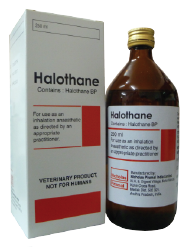Pharmacology definition - General Anesthetic Agent

General anesthetic agent
General anesthetic agent is useful in providing general anesthetic induction and maintenance during the surgical procedures. General anesthetic agent may carry its own side effects. Generally the common side effects of general anesthetic agent are gastrointestinal discomfort, myocardial infarction, increased in the cerebral blood flow and respiratory depression.
The common general anesthetic agent include isoflurane, methoxyflurane and enflurane ( both are nephrotoxic while enflurane alone may cause seizures), halothane ( may cause fulminant hepatic necrosis, cardiac arrhythmias and hypotension) desflurane and sevoflurane.
General anesthetic agent may lead to an activation of the GABA A receptor which decreased neuronal activity.
Halothane which is administered together with succinylcholine may lead to malignant hyperthermia. Malignant hyperthermia is characterized by elevation in body temperature and muscle rigidity. Malignant hyperthermia is treated with dantrolene.
General anesthetic agent is useful in providing general anesthetic induction and maintenance during the surgical procedures. General anesthetic agent may carry its own side effects. Generally the common side effects of general anesthetic agent are gastrointestinal discomfort, myocardial infarction, increased in the cerebral blood flow and respiratory depression.
The common general anesthetic agent include isoflurane, methoxyflurane and enflurane ( both are nephrotoxic while enflurane alone may cause seizures), halothane ( may cause fulminant hepatic necrosis, cardiac arrhythmias and hypotension) desflurane and sevoflurane.
General anesthetic agent may lead to an activation of the GABA A receptor which decreased neuronal activity.
Halothane which is administered together with succinylcholine may lead to malignant hyperthermia. Malignant hyperthermia is characterized by elevation in body temperature and muscle rigidity. Malignant hyperthermia is treated with dantrolene.
